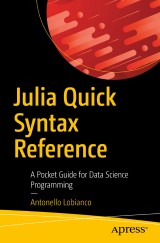Details

Julia Quick Syntax Reference
A Pocket Guide for Data Science Programming|
56,99 € |
|
| Verlag: | Apress |
| Format: | |
| Veröffentl.: | 11.11.2019 |
| ISBN/EAN: | 9781484251904 |
| Sprache: | englisch |
Dieses eBook enthält ein Wasserzeichen.
Beschreibungen
<div>This quick Julia programming language guide is a condensed code and syntax reference to the Julia 1.x programming language, updated with the latest features of the Julia APIs, libraries, and packages. It presents the essential Julia syntax in a well-organized format that can be used as a handy reference. </div><div><br></div><div>This book provides an introduction that reveals basic Julia structures and syntax; discusses data types, control flow, functions, input/output, exceptions, metaprogramming, performance, and more. Additionally, you'll learn to interface Julia with other programming languages such as R for statistics or Python. You will learn how to use Julia packages for data analysis, numerical optimization and symbolic computation, and how to disseminate your results in dynamic documents or interactive web pages. </div><div><br></div><div>In this book, the focus is on providing important information as quickly as possible. It is packed with useful information and is a must-have for any Julia programmer.</div><div><br></div><div><b>What You Will Learn </b></div><div><ul><li>Set up the software needed to run Julia and your first Hello World example</li><li>Work with types and the different containers that Julia makes available for rapid application development</li><li>Use vectorized, classical loop-based code, logical operators, and blocks</li><li>Explore Julia functions by looking at arguments, return values, polymorphism, parameters, anonymous functions, and broadcasts</li><li>Build custom structures in Julia</li><li>Interface Julia with other languages such as C/C++, Python, and R</li><li>Program a richer API, modifying the code before it is executed using expressions, symbols, macros, quote blocks, and more</li><li>Maximize your code’s performance </li></ul></div><div><br></div><div><b>Who This Book Is For</b></div><div><br></div><div>Experienced programmers new to Julia, as well as existing Julia coders new tothe now stable Julia version 1.0 release.</div><div><br></div>
<p>Part 1. Language Core.- 1. Getting Started.- 2. Data Types and Structures.- 3. Control Flow and Functions.- 4. Custom Types.- 5. Input – Output.- 6. Metaprogramming and Macros.- 7. Interfacing Julia with Other Languages.- 8. Efficiently Write Efficient Code.- Part 2. Packages Ecosystem.- 9. Working with Data.- 10. Mathematical Libraries.- 11. Utilities.</p>
<div>Antonello Lobianco, PhD is a research engineer employed by a French grande école (polytechnic university). He works on the biophysical and economic modelling of the forest sector and is responsible for the lab models portfolio. He does programming in C++, Perl, PHP, Visual Basic, Python, and Julia. He teaches environmental and forest economics at undergraduate and graduate levels and modelling at PhD level. For a couple of years, he has followed the development of Julia as it fits his modelling needs. He is the author of a few Julia packages (search sylvaticus on GitHub). </div><div><br></div>
<div>This quick Julia programming language guide is a condensed code and syntax reference to the Julia 1.x programming language, updated with the latest features of the Julia APIs, libraries, and packages. It presents the essential Julia syntax in a well-organized format that can be used as a handy reference. </div><div><br></div><div>This book provides an introduction that reveals basic Julia structures and syntax; discusses data types, control flow, functions, input/output, exceptions, metaprogramming, performance, and more. Additionally, you'll learn to interface Julia with other programming languages such as R for statistics or Python. You will learn how to use Julia packages for data analysis, numerical optimization and symbolic computation, and how to disseminate your results in dynamic documents or interactive web pages. </div><div><br></div><div>In this book, the focus is on providing important information as quickly as possible. It is packed with useful information and is a must-have for any Julia programmer.</div><div><br></div><div>You will:</div><div><ul><li>Set up the software needed to run Julia and your first Hello World example</li><li>Work with types and the different containers that Julia makes available for rapid application development</li><li>Use vectorized, classical loop-based code such as logical operators and blocks</li><li>Explore functions by looking at arguments, return values, polymorphism, parameters, anonymous functions, and broadcasts</li><li>Build custom structures in Julia</li><li>Interface Julia with other languages such as C/C++, Python, and R</li><li>Program a richer API, modifying the code before it is executed using expressions, symbols, macros, quote blocks, and more</li><li>Maximize your code’s performance </li></ul></div>
The first quick reference on Julia Provides important information as quickly as possible Contains information for today's data scientists and programmers
Diese Produkte könnten Sie auch interessieren:

A Software Process Model Handbook for Incorporating People's Capabilities

von: Silvia T. Acuna, Natalia Juristo, Ana Maria Moreno, Alicia Mon

149,79 €















